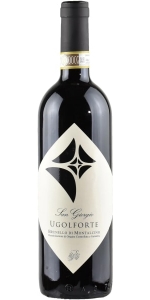Wine from San Giorgio
The San Giorgio estate is situated in an outstanding location, overlooking the Orcia valley and exposed to the climate of Mount Amiata.
The natural elements co-operate to offer to this area a very favourable dry climate, caused by the Mediterranean breeze coming from West and with powerful temperature uctutions between day and night, especially at the end of summer.
The Estate extends its property to over 142 hectares of which 26 ha are under vine and 26 ha are olive groves. The vineyards are positioned on steep rocky slopes, at an altitude ranging between 250 and 400 mt. facing east and south- east. The training system is “Cordon Spur” with a very low yield per hectare.
Thanks to the peculiar position of the vineyards and the variety of the terroirs this grape has plenty of space to express its complexity and personality. The average age of the vines is around 20 years. During the harvest the grapes are selected and picked manually.
San Giorgio Ugolforte presents a dark core of red and black berry fruit layered with earth, leather, smoke, and herbs. Complex and elegant, the wine is full on the palate and firm in tannin structure. Refreshing acidity frames a graceful finish. Classic Brunello di Montalcino.
This red is marked by cherry, plum, thyme, sage and loam aromas and flavors. Lively and firmly structured, featuring a saline undercurrent. An open-knit version, with nice equilibrium, fine energy and a long, resonant finish.
-Jeb Dunnuck 94 Points
-Wine Spectator 94 Points
- back
Selected Options
Wineries
Categories
Pricing
Countries
Regions
Grape Types
Wineries
Organic/Free Shipping
Domaine de Beaurenard Chateauneuf-du-Pape is made from 65% Grenache, 15% Syrah, 10% Mourvèdre.
Domaine de Beaurenard’s flagship wine is a quintessential blend, reflecting all the diversity of the terroir and the perfect synergy that exists between the soils and the grapes. It offers a supple and refined texture associated with a delicate aromatic palette that is the result of a constant quest for freshness.
Review:
Checking in as a blend of 65% Grenache, 15% Syrah, 10% Mourvèdre, and the rest a handful of varieties, the 2019 Châteauneuf Du Pape was brought up in a mix of foudre and older barrels. This deep ruby/purple-hued effort has a pure, vibrant, incredibly seamless, medium to full-bodied style that carries classic notes of black raspberry and black cherry fruits as well as peppery herbs, violets, spring flowers, and sous bois. This straight-up gorgeous, seamless, ultra-fine 2019 should be snatched up by readers. It has a rare mix of elegance, purity, and power, and it’s going to have two decades of prime drinking.
-Jeb Dunnuck 95 Points
Spinona Bricco Faset Barbaresco is made from 100 percent Nebbiolo.
This single-vineyard Barbaresco comes from Pietro Berutti's 8 hectares of coveted vineyards on the top of the historic hill, Faset. It is 270 meters above sea level with a south, south-east exposure. The vines are an average of 35 years old. Only organic farming practices are used. The natural fertilizer comes from the 100 head of cattle that they have and no herbicides or pesticides are used.
Barbaresco shows a deep ruby red color with garnet reflections. An intense bouquet with hints of ripe cherries, wild berries and spice. White pepper, licorice and mint blend with enticing floral notes. Mouth-filling and well-structured with a full, velvety body and an austere and long finish.
HARVEST: late October. The grapes are harvested by hand in perforated baskets to allow air to pass through the bunches. The pressing is soft. Cold maceration for 24 hours at 12°C (for certain years).
WINEMAKING: Soft pressing with an initial cold maceration on the skins for 24 hours at 12C. Specially selected yeasts are used. Fermentation takes place for 12 to 14 days in stainless steel at 28-29 °C under temperature controlled conditions. There is a pumping over on the skins. After malolactic fermentation, the wine is racked and goes through a delicate pressing to obtain only the best wine.
AGING : 12-15 months in large 25 hectolitre wooden barrels of Allier and Slavonian oak.
REFINING: in the bottle for 12-15 months in a temperature-controlled environment.
Excellent with game, red meats, truffle dishes and aged cheeses.
This single-vineyard Barbaresco comes from Pietro Berutti's 8 hectares of coveted vineyards on the top of the historic hill, Faset. It is 270 meters above sea level with a south, south-east exposure. The vines are an average of 35 years old. Only organic farming practices are used. The natural fertilizer comes from the 100 head of cattle that they have and no herbicides or pesticides are used.
Barbaresco shows a deep ruby red color with garnet reflections. An intense bouquet with hints of ripe cherries, wild berries and spice. White pepper, licorice and mint blend with enticing floral notes. Mouth-filling and well-structured with a full, velvety body and an austere and long finish.
Review:





